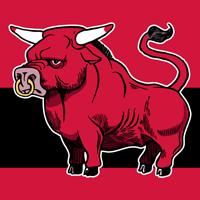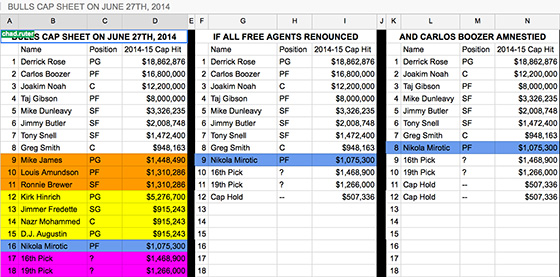| « Crunching the Numbers with the White Sox | Bowman, Blackhawks Prep For 2014 Draft » |
Bulls Thu Jun 19 2014
The Pursuit of Carmelo Anthony -- Chicago Bulls Edition
 Yes, LeBron James might be available this offseason. If he opts out of his contract, the Bulls should do everything in their power to pursue him before Carmelo Anthony. He's unquestionably the best player in the league, and provides the clearest path to the NBA Finals.
Yes, LeBron James might be available this offseason. If he opts out of his contract, the Bulls should do everything in their power to pursue him before Carmelo Anthony. He's unquestionably the best player in the league, and provides the clearest path to the NBA Finals.
But for this exercise, we're going to pretend the Big Three stay in Miami, which is the likeliest scenario at this point. And though Kevin Love is a really good player, he's a year away from potential free agency, which limits his availability to Hail Mary trade offers only. Anthony should be the Bulls' number one target this summer, and they need to go all in to get him if they want a shot at a title in the next three years.
To get a visual on the money involved, I've created a spreadsheet to show what the Bulls cap sheet would look like in different scenarios. Salary data for next season has been compiled from a number of different sources, including Spotrac (mostly), ShamSports, and ESPN.

Click to view the full spreadsheet on Google Drive
June 23 -- Anthony Contract Deadline
This is the reported date by which Carmelo has to decide whether to opt out of the final year of his contract. If he chooses to pick it up, he'll make $23,333,405 in 2014-15 and be the third highest player in the NBA behind Kobe Bryant and teammate Amar'e Stoudemire.
It's widely believed he'll choose to opt out and become a free agent, but even if he does opt in, it wouldn't necessarily end the Bulls' pursuit -- but it would make it incredibly difficult. Any trade with the Knicks would have to involve Carlos Boozer and his $16.8 million salary as the centerpiece just to make the salaries match. That's unlikely to pique the interest of new Knicks president Phil Jackson, who wouldn't have any obligation to trade Anthony in this scenario.
Why might Anthony surprise us all and opt in? The money, baby. He'd remain one of the highest paid players in the NBA this season, and would then be able to sign contracts next summer with a starting salary of $24.5 million. If he re-signed with the Knicks on a maximum contract then, he'd make almost $141 million over five years.
Let's assume he does what everyone expects, though, and decides to become a free agent.
June 26 -- NBA Draft
It's one of the deepest drafts in recent memory, and the Bulls have the 16th pick from the Bobcats thanks to the famed Tyrus Thomas trade, along with their own 19th pick. The Bobcats' selection was far more valuable when it had the chance to be unprotected in 2016 and its stock has plummeted now that it's actually being conveyed.
The Bulls are looking for scorers, backup point guards, and a rotational big man at their spots in the draft, but also have interest in moving up to grab a player who may have a more immediate impact, like Nik Stauskas, Doug McDermott or Gary Harris. They've been rumored to have offered both their first round picks to Denver for the 11th overall pick, with the dual effect of freeing up some extra cap space to pursue Anthony. In reality, moving up to 11 and sacrificing both first rounders would only net the Bulls roughly $330,000 in extra space (because a cap hold takes the place of the pick). If the Bulls are moving up in the draft, it is independent of any sort of Anthony trade, and they're simply trying to get the best player to fit in with Derrick Rose and Joakim Noah.
July 18 -- Amnesty Deadline
We skipped ahead in the timeline because it's important to note that the Bulls don't have to decide if they want to use the amnesty provision on Boozer and his $16.8 million contract before July 18. They can essentially make all their major free agent decisions with the option of deleting Boozer's contract off their cap sheet (though they'd still have to pay him) at any time. All the dominoes should fall before they're forced to make this decision.
July 1 -- Free Agency Begins
Back to July 1. This is when the party starts. Though teams can't officially sign players until July 10 (because the league is auditing during this time to set the official salary cap for next season -- estimated to be $63.2 million), they can negotiate and come to agreements in principle.
The key figure to keep in the back of your mind is the amount the Knicks can offer: five years, $129.1 million. They can offer him the fifth year and 7.5 percent raises per season (with a $22,458,401 first year salary), something no other team has the ability to do. Any other team wishing to offer him a maximum contract can do so for just four years at $95.9 million (4.5 percent raises on top of the same starting salary).
Why are those numbers important? Because the Bulls can't offer him anything close to that on a straight free agent contract. The best they can do is a starting salary in the $14.5 million range in year one, and that's only after renouncing all free agents, cutting all non-guaranteed players (second column of spreadsheet), amnestying Boozer (third column), and trading Mike Dunleavy for picks (fourth column). Over four years, the total comes to about $60.6 million, and that still leaves three roster spots needing to be filled by minimum salaried players. It's hard to imagine him taking $35 million less than he can get from the other 28 free agent destinations after he's already lighting a little more than $33 million on fire by not staying in New York.
There has to be a trade of some sort to make things work. And the Knicks need to get value in return. Remember when the Big Three went to Miami? That ended up being sign-and-trade deals for both James and Chris Bosh that netted Cleveland a haul of draft picks, and Toronto their own first round pick they had previously dealt to Miami. Sure, none of them would be in the top 20, but lower first round and second round picks have a ton of value in today's NBA because they're cost controlled.
The situation with the Bulls and Anthony is far different than what happened in the Summer of LeBron, however. The Bulls can't outright sign Anthony for the type of money he wants like Miami (and Chicago) could do with LeBron, Bosh and Dwyane Wade in 2010. The Knicks have leverage here, and the difficult part of the equation is getting salaries to match up. To prepare for this, Gar Forman and John Paxson made some under-the-radar moves in April, signing Ronnie Brewer, Mike James and Lou Amundson to deals not only for the rest of last season, but also included non-guaranteed contracts for this upcoming season. Meaning the dollar figure on their contracts can be used in trades, but the team that acquires them can cut them anytime before the season begins and not have to pay them, or have their salaries on their cap sheet.
The rabbit hole goes deeper, though. The Bulls had to wait until April to sign these guys in an attempt to stay under the luxury tax threshold for last season. It was the main driving force behind trading Luol Deng, and the front office had to sweat it out until the day the All-NBA teams were announced because Joakim Noah and Taj Gibson each had possible bonuses they could've hit. The result: Noah got his, and Gibson didn't -- leaving the Bulls barely $300,000 under the tax. Great news, except for having to wait until mid-April to sign those three players. In the NBA, a player can't be traded for three months after he signs his contract. So the Bulls will likely have to wait until after the July 10 start date (probably the 15th) for signing free agents to actually consummate a deal.
Still with me? Bless you, if you are. The Knicks don't want Boozer. Fine, he's amnestied. His salary would be great to match up with the Knicks, but you can't force them to take his scream.
Without trading Rose or Noah, anything involving Anthony is going to require Gibson's contract. One other fact to note is that if Anthony becomes a free agent, and the Bulls renounce the rights to Kirk Hinrich (they will), it will leave both teams over the salary cap, but under the luxury tax by healthy margins. This is important for the trade because it allows both teams far more flexibility when it comes to matching salaries.
Anthony will most likely want at least $20 million in year one. That would get him to $83.6 million over the life of the maximum four-year deal allowed in a sign-and-trade with 4.5 percent raises -- only $12.3 million less than what a team with max cap space could offer him. So here's how it would go down:
The Trade
Bulls Get:
Carmelo Anthony ($20,000,000 contract)
Knicks Get:
Taj Gibson ($8,000,000 contract)
Mike Dunleavy ($3,326,235 contract)
Mike James ($1,448,490 contract)
Louis Amundson ($1,310,286 contract)
Ronnie Brewer ($1,310,286 contract)
$4,604,703 Traded Player Exception
Dunleavy more than likely has to be included because it's the only way to get the Bulls' side of the trade up past the $15 million mark (necessary because if Anthony wants $20 million in year one, the Bulls have to send out at least $15 million). The Bulls could use Deng's traded player exception and a future first round pick instead of Dunleavy, but the math gets trickier than it already is, and it would mean a lower contract for Anthony. The Knicks get a very good player in Gibson, a very tradable asset in Dunleavy (they would get a ton of calls about him), a healthy trade exception they can use to acquire players in the next year, along with three contracts they can immediately dispose of.
That leaves the Bulls (last column of spreadsheet) with a starting lineup of Rose, Butler, Anthony, rookie power forward, and Noah. Their bench would consist of Tony Snell, Greg Smith and another rookie. They'd have both the mid-level exception and the bi-annual exception to sign anywhere between two and four players, with anything left over being only veteran minimum contracts. It leaves them incredibly thin, but it also gives them one of the best starting lineups in the league even if a ball boy is playing at the four. If management could somehow convince Nikola Mirotic to come over from Spain, it would bolster the roster that much more. If the Bulls could throw in Deng's TPE instead of Dunleavy to match salaries, all the better in terms of roster depth.
The Bulls are in a position to make a title-rattling move if they're able to acquire Carmelo Anthony this summer. By no means is the path a simple one (as it took roughly 2,000 words to draw it all out), but it's their only path to the Finals next year if the Miami Heat retain LeBron, Bosh and Wade. That, and Rose has to still have two knees by then.
Let the summer of Carmelo begin.









Karen / July 3, 2014 9:56 AM
I stayed with you the entire article, and now I finally get it when it comes to the Bulls signing Melo.